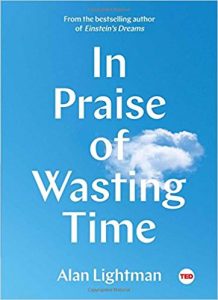In Praise of Wasting Time (Alan Lightman, 2018)

The pace of kingdom living
Alan Lightman, novelist and physicist at MIT, thinks we need to slow down and reflect on how our lives have changed. He doesn’t doubt the value of progress, but argues we’ve been slow to consider the costs.
Indeed, an enormous transformation has occurred in the world from the 1950s and ‘60s of my youth to today. A transformation so vast that it has altered all that we say and do and think, yet often in ways so subtle and ubiquitous that we are hardly aware of them. Among other things, the world today is faster, more scheduled, more fragmented, less patient, louder, more wired, more public. [p. 4]
Lightman identifies three costs that the ever-increasing levels of distraction and busyness have extracted. First, we have no leisure for recreation—meaning to re-create, to take the unhurried time needed to freely nurture unrestricted imagination and creativity. Second, he says, medical research shows our busyness has “endangered the needed replenishment of mind that comes from doing nothing in particular” [p. 8]. And finally, Lightman says, he senses what could be called a loss of soul. “But I have lost more. I believe I have lost something of my inner self. By inner self I mean that part of me that imagines, that dreams, that explores, that is constantly questioning who I am and what is important to me” [p. 9].
In Praise of Wasting Time began as a TED Talk, and is the sort of book that begs to be read and discussed. It is a brief, small format book, passionate and thoughtful, touching on issues that get to the heart of what it means to be human.
As you might guess from his title, Lightman is convinced that much of what has been condemned as “wasting time” is essential if we are to flourish as persons. Unhurried reflection, time to be deliciously bored to allow half-formed ideas to percolate, the chance to slow down and simply observe nature and art, to read not just what we need to read but things that feed our imaginations and hearts, opportunities to wonder at what is and what could be, to meditate, to pray and wait, and then wait some more—all this and more is not wasting time but perhaps the best uses of time we can muster.
We are losing our ability to know who we are and what is important to us. We are creating a global machine in which each of us is a mindless and reflexive cog, relentlessly driven by the speed, noise, and artificial urgency of the wired world. What can we do? Somehow, we need to create a new ‘habit of mind,’ as individuals and as a society. We need a mental attitude that values and protects stillness, privacy, solitude, slowness, personal reflection; that honors the inner self; that allows each of us to wander about without schedule within our own minds. [p. 85]
When he sets out to identify what’s gone wrong, Lightman identifies some popular Christian practices and ideas along with technological and economic progress as problematic. As a Christian, sadly, I think he has a point, and believe this is an opportunity for Christians to return to a more biblical perspective on time, work and rest. We should do so not just for the sake of our souls and the glory of God—though that should be sufficient—but as a witness to a world being swept along in fast paced lives going nowhere.
We were created to live in time and God said it was good. Our problem is that we refuse to order our lives within biblical categories, accepting our finiteness as a gift and trusting God enough to set aside our work because we trust he will provide. Our difficulty is made worse when technology, a frenzied media, social networks and the marketplace squeeze us into accepting busyness, efficiency and productivity as final measures of life. Faithfulness, in other words, includes wasting time to God’s glory.
I recommend In Praise of Wasting Time to you.
Book recommended: In Praise of Wasting Time by Alan Lightman (New York, NY: TED Books, Simon & Schuster; 2018) 90 pages (small format) + notes

